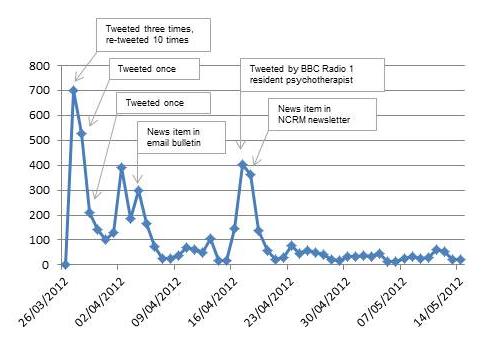 Blogs are now an established part of the chattersphere/public conversation, especially in international development circles, but Duncan Green finds academic take-up lacking. Here he outlines the major arguments for taking blogging and social media seriously. It doesn’t need to become another onerous time-commitment. Reading a blog should be like listening to the person talk, but with links.
Blogs are now an established part of the chattersphere/public conversation, especially in international development circles, but Duncan Green finds academic take-up lacking. Here he outlines the major arguments for taking blogging and social media seriously. It doesn’t need to become another onerous time-commitment. Reading a blog should be like listening to the person talk, but with links.
Before I started teaching at LSE in January, I had the impression that the academics and researchers around the school were totally social media savvy – prolific tweeters like Charlie Beckett and top blogs like LSE Impact are high up on my follow list.
It turned out the impression was, ahem, a little misleading. A good proportion of the people I have come across may be brilliant in their field, but when it comes to using the interwebs, tend to sound like the querulous 1960s judge asking ‘What is a Beatle?’ (‘I don’t twitter’). Much of life is spent within the hallowed paywalls of academic journals (when I pointed out that no-one outside academia reads them, the baffled response seemed to be along the lines of ‘and your point is?’).
So why should they rethink? Here are some initial arguments, confined to blogs and twitter (the only bits of social media I engage with). I’m sure there are lots of others – feel free to add:
- Remember that a blog is a ‘web log’, i.e. an online diary. Regular blogging builds up a handy, time-saving archive. I’ve been blogging daily since 2008. OK, that’s a little excessive, but what that means is that essentially I have a download of my brain activity over the last 7 years – almost every book and papers I’ve read, conversations and debates. Whenever anyone wants to consult me, I have a set of links I can send (which saves huge amounts of time). And raw material for the next presentation, paper or book.
- Making sure someone reads your research. Look no further than the excellent LSE Impact blog for evidence: here’s a quick search of their posts:
Patrick Dunleavy argues blogging and tweeting from multi-author blogs especially is a great way to build knowledge of your work, to grow readership of useful articles and research reports, to build up citations, and to foster debate across academia, government, civil society and the public in general.
World Bank research on economics blogging (with regressions, natch) concluded:
Blogging about a paper causes a large increase in the number of abstract views and downloads in the same month: an average impact of an extra 70-95 abstract views in the case of Aid Watch (now sadly defunct) and Chris Blattman, 135 for Economix, 300 for Marginal Revolution, and 450-470 for Freakonomics and Krugman. [see regression table here and below]
These increases are massive compared to the typical abstract views and downloads these papers get- one blog post in Freakonomics is equivalent to 3 years of abstract views! However, only a minority of readers click through – we estimate 1-2% of readers of the more popular blogs click on the links to view the abstracts, and 4% on a blog like Chris Blattman that likely has a more specialized (research-focused) readership.
 Source: Academic blogs are proven to increase dissemination of economic research and improve impact.
Source: Academic blogs are proven to increase dissemination of economic research and improve impact.
LSE Impact resources for twitter users include:
- The effect of twitter on publication downloads
- A short guide to Using Twitter in university research, teaching, and impact activities
 Source: Who gives a tweet? After 24 hours and 860 downloads, we think quite a few actually do
Source: Who gives a tweet? After 24 hours and 860 downloads, we think quite a few actually do
- It gives you a bit of soft power (let’s not exaggerate this, but check out slide 15 of this research presentation [ppt] for some evidence). Blogs are now an established part of the chattersphere/public conversation, so you get a chance to put your favourite ideas out there, and spin those of others. People in your organization may well read your blogs and tweets even if they don’t read your emails.
- Blogging is a great antidote to that feeling of anticlimax and futility that comes after you send off the paper or the book manuscript, and suddenly the true indifference of the universe becomes apparent. You can keep discussing and communicating with interesting people, and keep the existential crisis at bay.
- And don’t forget the free books, also known as ‘review copies’.
- And the chance to publicly insult your enemies (not relevant in my case, obvs, as I don’t have any).
“I Don’t Have Time”
The counter-argument is bound to be ‘we don’t have time’, but if you take too long, that probably means the blog won’t be very accessible. Reading a blog should be like listening to the person talk, but with links. This post took me precisely 30 minutes to write, including the ‘research’.
Maybe Twitter’s apparent time-efficiency explains why Twitter seems better represented than blogging (though I only found this out by writing this post and circulating it!). In the International Development faculty (including honorary fellows and Professors in Practice) we have Owen Barder, Pritish Behuria, Mayling Birney, Benjamin Chemouni, Jean Paul Faguet, Danny Quah, Keith Hart, Sohini Kar, Silvia Masiero, Rajesh Venugopal and Kevin Watkins. Did I miss anyone? Oh yes, me.
If you’re interested in dipping your toe in the social media ocean, here are some tips for bloggers on international development and a previous effort to convince sceptics. But the best thing is just to try it and see. At the very least, follow Chris Blattman to see how it’s done.
This piece originally appeared on the LSE International Development blog and is reposted with permission. Keith (k.mcdonald@lse.ac.uk) is currently the Managing Editor of the International Development blog. Get in touch if you want to have a go.
Note: This article gives the views of the author, and not the position of the Impact of Social Science blog, nor of the London School of Economics. Please review our Comments Policy if you have any concerns on posting a comment below.
Duncan Green is Senior Strategic Adviser for Oxfam GB and Professor in Practice in the department for International Development at LSE. He is also author of the book ‘From Poverty to Power’. He can be found on twitter @fp2p.







I agree that blogs and related articles deserve more of our attention. Having just sent your editor such an article, I could scarcely have a different opinion!
I would add that content curation (particularly using scoop.it) is a nice (new) way to stay up to date and to build thought leadership in scientific topics
I also feel blogging is important. We may put our publications on our university profiles, but not blogs – despite some academic blogs being very good and often citable sources. This needs to change!
Great article Duncan
Yeah it doesn’t take much time and if you do it regularly you become good at it. Blogging can help in academics and we should really take this seriously as it will really help the developmental process of a student.
I couldn’t agree more. I have been blogging since 2010. It makes you and your research searchable. My academic research on SuperBowl ads probably wouldn’t have seen the light of day outside a couple reads for lit reviews, but one post on my blog lead to it being written about by a searching journalist in Slate, then Harvard Business Review, Entrepreneur, Forbes, New York Times, The New Yorker, Time Magazine … and quoted in 7 books. I am sure this this increased the academic citations, but also simply got the research out there and discussed which is rewarding.
Blogging is also a great way to learn. When i don’t know about something like a new development in my field I force my self to write a blog post about it. I have also been requiring my students to blog since 2012. They learn by researching and writing posts, but also applying strategies from class. I hear back about how student blogs lead to countless career opportunities for them.
Your blog continues to inspire me not only to have a successful blog but to have a blog filled with quality. I hope to one day be as impactful as I’m sure you have been to many!
They also should embrace content curation regularly, to stay abreast of knowledge in a time of information overload or so-called “infobesity” and help students learn validated, reliable up to date information